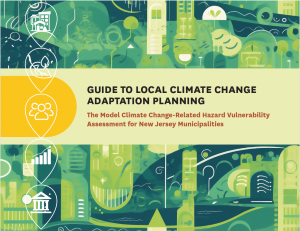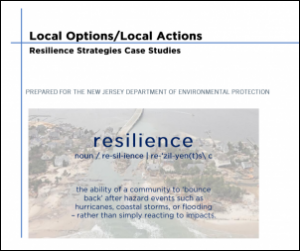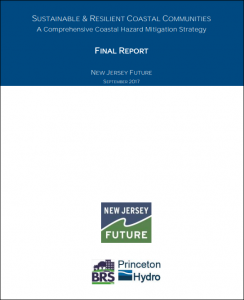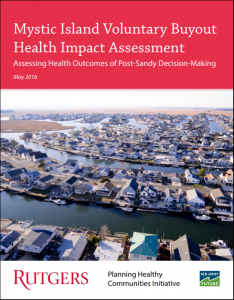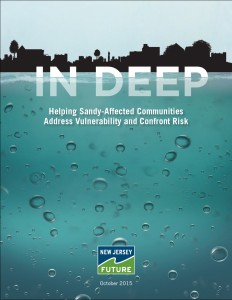Climate Adaptation and Resilience
Climate change is happening at an unstable pace. We have the ability and imperative to slow that change by reducing the amount of greenhouse gases we release into the atmosphere. But, even if we promptly halt all human activity that affects climate, changes have already been set in motion, and we will continue to feel the impacts of rising seas, increases in intense precipitation, extreme heat and drought, and other environmental alterations.
The world is changing, and we will need to adapt to meet these changes in a thoughtful, environmentally positive, and socially equitable manner. Climate adaptation involves changing the way we do things in order to minimize the negative effects of a changing climate. Keeping areas that are expected to flood free from development, significantly reducing impervious surfaces that cause stormwater runoff, designing and investing in infrastructure that’s climate-ready, restoring and supporting natural systems that keep air and water clean, and fostering climate awareness and leadership are examples of climate adaptation that will keep us safer, our communities healthier, and our economies stronger.
Climate resilience is the ability to recover quickly and fully from climate-related issues or events, instead of simply reacting to them as they occur. It involves having the appropriate laws, policies, and procedures in place so that state and local responses can be effective and swift when there is a climate-related event. It also means that communities are proactively assessing their climate vulnerabilities and developing strategies to address them—before a damaging event occurs. It’s a framework to continually engage with the dynamic set of conditions that a changing climate brings through an ongoing process of learning from and redesigning for the impacts of climate change.
An intentional focus on racial and economic equity is central to how New Jersey Future approaches climate adaptation and resilience. The existing disparities in health, income, wealth, and access to resources that plague New Jersey translate into disproportionate climate vulnerability for those communities and individuals who are already experiencing the effects of racial and economic discrimination. Resilient and sustainable communities can only be achieved through equitable and just solutions.
New Jersey Future has been an active partner in formulating solutions for climate adaptation and resilience by working to:
- Advance local and state policies and practices
- Develop technical guidance for state and local action
- Assist communities in their resilience efforts
New Jersey Future Climate Adaptation and Resilience Reports
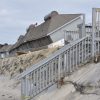
Both before and after Superstorm Sandy, the trend at the Jersey Shore has been toward higher home values, a smaller percentage of housing units being occupied year-round, and an increasing presence of retirees among year-round residents. Is the Shore becoming a playground for the rich? And specifically rich retirees?

The science is clear: climate change is here, and its threats are only going to grow more pronounced. But, carefully coordinated efforts can not only protect New Jerseyans from these threats, but can help spur economic activity, as well, making our state that much stronger. That was the message from four senior-level officials from Governor Murphy’s administration at the 2021 Planning and Redevelopment Conference, hosted by New Jersey Future and the NJ Chapter of the American Planning Association.

New Jersey Future is proud to be an inaugural member of the important and growing Rise to Resilience coalition, a group of New Jersey and New York residents, leaders in the business, labor, and justice communities, volunteer organizations, scientists, and environmental advocates.
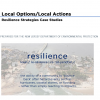
New Jersey Future analyzed 350 innovative strategies applied in 76 cities or regions that could serve as model initiatives to develop the 15 strategies detailed in the Local Options/Local Actions: Resilience Strategies Case Studies report for the New Jersey Department of Environmental Protection (NJDEP).

As part of New Jersey Future’s Community Rating System (CRS) planning assistance program, Medford, NJ met with NJF’s planning team on Dec. 19 to begin the process of becoming a CRS community.
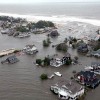
A one-hour webinar explaining a new, parcel-based tool that assesses financial vulnerability to coastal flooding and sea-level rise. Friday, May 15, 2015, noon – 1:00 pm.
An interim report, three years after Hurricane Sandy, on New Jersey Future’s groundbreaking local recovery planning manager program, including lessons learned and recommendations. October 2015.
Oct. 28, 2014 — Two years after the devastation wrought by Hurricane Sandy, many of New Jersey’s coastal communities continue to struggle with recovery and rebuilding efforts. The highest community priority is to get people back into their homes, re-establish business operations and return to life as close to normal as possible. The elected officials who have led these efforts are hardworking heroes. But it’s also clear that recovery decisions made without a clear understanding of future risks can move people back into harm’s way, build infrastructure that will be damaged again, and waste taxpayer dollars.
Sept. 4, 2013 — Of all the recommendations that came out of President Obama’s Sandy Rebuilding Task Force Strategy, there is one that will help inform much of the other recovery planning that is currently being done: Incorporate projected sea-level rise into all decision-making.
Nov. 20, 2012: The State Strategic Plan is a framework, a guiding document of only 41 pages that promotes sound planning but doesn’t attempt to do the actual planning work. Any changes in it to address the need for resiliency should remain high-level and provide the parameters within which to make changes, but not prescribe the actual changes.
See all New Jersey Future Blog posts and articles in this category »

